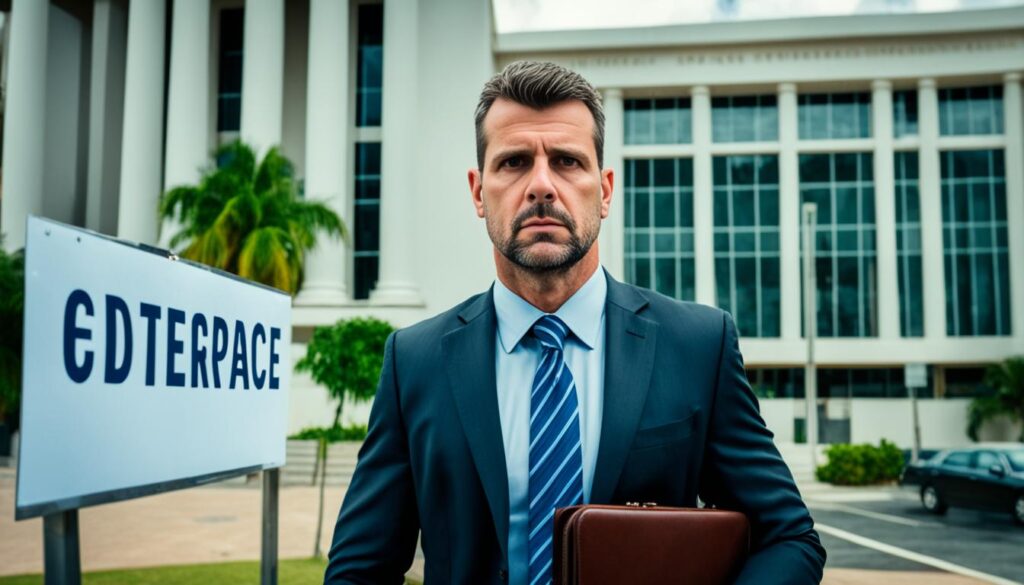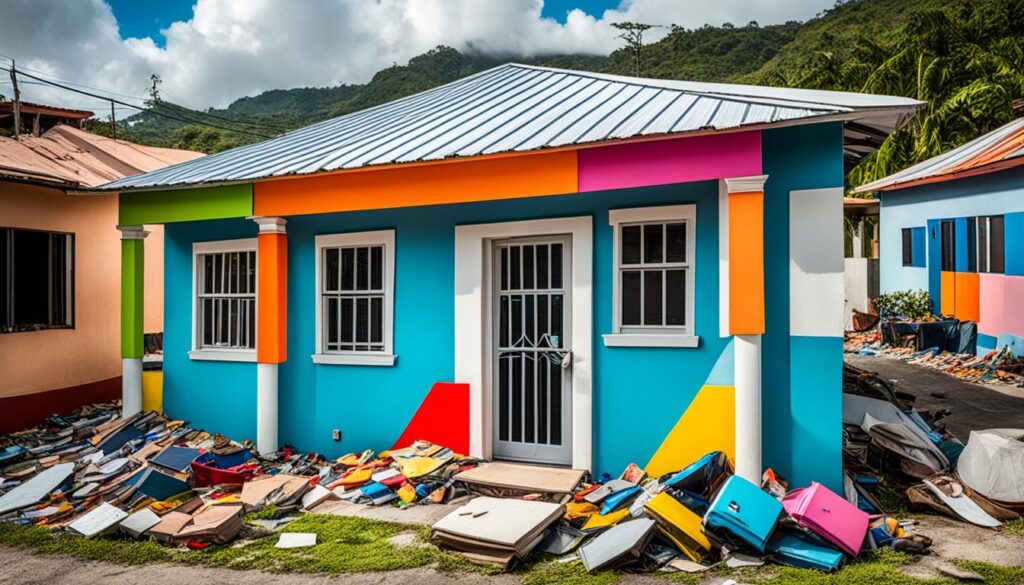Getting a divorce in Honduras can be a complicated procedure, however, with the proper understanding and assistance, it is possible to navigate it effectively. Whether you are going through a divorce by mutual agreement or a contested one, it is advisable to have legal representation to safeguard your rights and ensure a smooth process.
In Tegucigalpa, Honduras, the legal process of divorce is governed by the Family Code. This legal framework allows for divorce in various situations, including mutual consent, abandonment, adultery, and cruelty. It is highly recommended to have legal representation when navigating the divorce process in Honduras, especially in cases involving child custody disputes, significant asset division, spousal maintenance, or contested divorce.
Key Takeaways:
- Legal representation is essential when getting divorced in Honduras to protect your rights and ensure a smooth process.
- The legal process of divorce in Honduras is governed by the Family Code and allows for divorce in various situations.
- Child custody disputes, significant asset division, and contested divorce cases require specialized legal assistance.
- Consulting with a local family lawyer will help you understand the specific laws and requirements in Honduras.
- Utilize available resources, such as nonprofit organizations and counseling, to support you during this challenging time.
Divorce Laws and Requirements in Honduras
When it comes to divorce in Honduras, understanding the laws and requirements is essential. In Tegucigalpa, the capital city of Honduras, local laws dictate that at least one spouse must have Honduran residency to pursue a divorce. Whether it’s a mutual consent divorce or one that undergoes a judicial process, there are specific legal steps that need to be followed.
Divorce in Honduras can be more complex and time-consuming than expected. It is important to be aware of the residency requirement and ensure that it is met before initiating divorce proceedings. If you or your spouse does not fulfill this requirement, it may be necessary to explore alternative options or seek legal advice from a professional specializing in family law.
One of the key aspects of divorce is the division of assets. In Honduras, the division is typically based on the marital property system agreed upon in a prenuptial agreement or, in the absence of such an agreement, the default community property system. It is advisable to consult with a lawyer to ensure that the division of assets follows the appropriate legal guidelines and is fair to both parties involved.
Child custody is an important consideration in divorce cases. In Honduras, the best interests of the child are paramount in determining custody arrangements. Courts typically prioritize joint custody if it is feasible and in the best interests of the child. It is important to approach child custody matters with a focus on the child’s well-being and consult with legal professionals to navigate this aspect of the divorce process.
Seeking legal representation with expertise in divorce laws in Honduras is highly recommended to ensure compliance with the relevant legal requirements and protect your rights throughout the divorce process. A skilled family lawyer can provide guidance, assist with document preparation, and advocate for your interests during negotiations or court proceedings.
Residency Requirements for Divorce in Honduras
| Residency Requirement |
|---|
| At least one spouse must have Honduran residency |
To gain a better understanding of divorce laws and requirements in Honduras, it is advisable to consult with a local family lawyer who can provide personalized legal advice tailored to your specific situation. By having a clear understanding of the legal framework and requirements, you can navigate the divorce process more effectively and ensure the best possible outcome for all parties involved.
Why You May Need a Lawyer for Divorce in Honduras
When going through a divorce in Honduras, it is essential to consider hiring a lawyer to navigate the complexities of family law. The legal expertise and guidance provided by a local attorney can greatly benefit individuals seeking a divorce in Honduras. Whether it’s obtaining legal advice, preparing necessary documents, handling negotiations, or representing your interests in court, a lawyer can offer invaluable support throughout the divorce process.
One of the significant benefits of hiring a lawyer for divorce in Honduras is their ability to provide essential legal advice tailored to your specific situation. They have a deep understanding of the local laws and regulations governing divorce, ensuring that you make informed decisions throughout the process. With their expertise, you can better understand your rights and options, empowering you to make sound choices that protect your interests.
The Benefits of Legal Representation
An experienced lawyer can assist in document preparation, ensuring that all required legal forms and paperwork are correctly completed. This attention to detail helps prevent potential delays or errors that could impede the progress of your divorce. Additionally, a lawyer can guide you through the necessary steps, ensuring that you meet all legal requirements and deadlines.
“Hiring a lawyer for divorce in Honduras can provide peace of mind and alleviate some of the stress during this challenging time. They can handle the legal complexities, allowing you to focus on healing and moving forward with your life.”
For individuals involved in child custody disputes or cases that involve significant assets, hiring a lawyer becomes even more crucial. An attorney who specializes in family law can navigate the intricacies of child custody laws and fight for the best interests of your children. They can also negotiate fair division of assets, protecting your financial security and ensuring a more equitable outcome.
In contested divorce cases, where there may be disagreements or disputes between spouses, having legal representation is vital. A lawyer can act as a mediator, facilitating negotiations and working towards an amicable resolution. If the case goes to court, your lawyer can aggressively advocate for your rights and present a compelling case on your behalf.
Overall, hiring a lawyer for divorce in Honduras provides numerous benefits, including:
- Expert legal advice tailored to your specific situation
- Assistance with document preparation and meeting legal requirements
- Effective representation in negotiations and court proceedings
- Protection of your rights and best interests, particularly in child custody and asset division
- Reduction of stress and peace of mind
When considering a divorce in Honduras, it is wise to consult with a local lawyer who has a deep understanding of the legal system and can provide the necessary guidance and representation throughout the process.

Steps to Take When Getting Divorced in Honduras
When it comes to getting divorced in Honduras, following the right steps is essential to ensure a smooth process. By understanding the necessary procedures, you can navigate through the divorce proceedings with confidence. Here are some key steps to consider:
- Filing a divorce petition: The first step is to file a divorce petition with the appropriate court. This legal document initiates the divorce process and outlines the reasons for seeking a divorce.
- Gathering necessary documents: It’s important to gather all the required documents, such as marriage certificates, identification documents, financial records, and any other supporting evidence relevant to the divorce.
- Attending court hearings: Depending on the specific circumstances, you may need to attend court hearings. These hearings provide an opportunity for both parties to present their case and resolve any contentious issues.
- Negotiating settlement agreements: If possible, spouses can negotiate and reach mutually acceptable settlement agreements regarding child custody, asset division, and financial support. This can help expedite the divorce process and minimize conflict.
- Finalizing the divorce decree: Once all legal requirements and agreements have been addressed, the final step is to obtain the divorce decree. This document officially terminates the marriage and outlines the rights and responsibilities of each party moving forward.
Throughout these steps, it is highly recommended to consult with a local family lawyer who specializes in divorce proceedings in Honduras. An experienced attorney can guide you through each stage, ensure compliance with the legal requirements, and protect your rights and interests during the divorce process.
“Working with a knowledgeable attorney can greatly simplify the divorce process in Honduras, ensuring that you navigate each step with confidence and clarity.”
By following these steps and seeking professional legal guidance, you can have a better understanding of what to expect and can have a smoother experience when getting divorced in Honduras.

Child Custody and Support in Divorce Cases in Honduras
Child custody and support are crucial considerations in divorce cases in Honduras. When determining child custody, the best interests of the child take precedence. Factors such as the child’s age, relationship with each parent, and stability of the home environment are taken into account. The goal is to ensure that the child’s well-being and upbringing are prioritized, even in the midst of the divorce process.
In Honduras, there is a preference for joint custody if it is feasible and in the best interests of the child. This means that both parents have an active role in making important decisions regarding the child’s upbringing and welfare. Joint custody allows for continued involvement and support from both parents, which is considered beneficial for the child’s overall development.
Child support is another crucial aspect of divorce cases in Honduras. It aims to ensure that the financial needs of the child are met even after the parents’ separation. Child support is determined based on various factors, including the financial capabilities of each parent and the specific needs of the child. The court will assess the income, assets, and expenses of both parents to determine a fair and reasonable amount of child support.
“Child custody and support are essential components of the divorce process in Honduras, as they focus on the best interests and well-being of the child. The goal is to minimize any negative impact on the child’s life and provide a stable and nurturing environment.”
It is important to consult with a qualified family lawyer in Honduras to navigate child custody and support issues during divorce. A knowledgeable lawyer can provide guidance on legal procedures, help negotiate custody arrangements, and advocate for the child’s best interests. With their expertise, parents can ensure that the child’s needs are met and that their parental rights and responsibilities are protected.
Remember, every divorce case is unique, and the specific arrangements for child custody and support will vary based on the circumstances of each family. Seeking professional legal advice is crucial to ensure that the best solutions are reached for all parties involved.
Division of Assets in Divorce in Honduras
In divorce cases in Honduras, the division of assets plays a significant role in determining the financial outcomes for both parties involved. This section explores the key aspects of the division of assets in divorce proceedings in Honduras, including the impact of prenuptial agreements and the default community property system.
The Role of Marital Property and Prenuptial Agreements
Marital property refers to the assets and debts acquired by both spouses during the course of their marriage. In Honduras, the division of assets in divorce is typically based on the marital property system agreed upon in a prenuptial agreement, if one exists. A prenuptial agreement is a legal contract that outlines the division of assets and liabilities in the event of a divorce or separation.
If a prenuptial agreement does not exist, the default community property system is applied. Under this system, assets accumulated during the marriage are considered joint property and are divided equally between the spouses upon divorce.
“Prenuptial agreements provide couples with the opportunity to establish their own terms for asset division, ensuring a fair and equitable arrangement in case of a divorce,” explains Laura Ruiz, a family lawyer specializing in divorce cases in Honduras.
Ensuring Fair and Equitable Asset Division
Consulting with a lawyer is crucial to ensure a fair and equitable division of assets during the divorce process in Honduras. A lawyer can provide guidance, navigate the legal complexities, and advocate for their client’s best interests. They can help identify and value assets, negotiate settlements, and represent their clients in court if necessary.
It is also important for both spouses to accurately disclose all assets and debts during the divorce proceedings. This transparency ensures a comprehensive understanding of the marital estate and aids in achieving a fair division of assets.
Considering Unique Circumstances
In certain cases, unique circumstances may arise that require additional consideration when dividing assets in divorce. These circumstances may include inheritances, businesses, investments, and other complex financial arrangements. In such instances, a lawyer can provide invaluable expertise in assessing the value of these assets and determining an appropriate division.

Support and Resources for Divorce in Honduras
Going through a divorce can be an emotionally challenging time, but there are resources and support available to help individuals navigate the process in Honduras. Whether you need legal support, guidance, or counseling, there are various options to consider.
Legal Support for Divorce in Honduras
When it comes to obtaining legal assistance for your divorce, one reliable resource is the Honduran Family Court. They can provide information on the legal requirements, procedures, and documentation needed for the divorce process. It’s recommended to consult with a family lawyer who specializes in divorce cases to ensure your rights and interests are protected throughout the proceedings.
Additionally, there are local nonprofit organizations that offer legal aid and assistance to individuals going through a divorce. These organizations can provide guidance, help with document preparation, and offer support during negotiations or court appearances. Some well-known organizations in Honduras include:
- Honduran Legal Aid Society
- Family Law Foundation
By reaching out to these organizations, you can access valuable resources and expert advice to navigate your divorce with confidence.
Counseling for Divorce in Honduras
Divorce can take a toll on your mental and emotional well-being. It’s important to prioritize self-care and seek support from trained professionals who can help you navigate the emotional challenges associated with divorce.
In Honduras, there are counseling services and support groups available to individuals going through a divorce. These services can provide a safe space for you to express your feelings, gain coping strategies, and receive guidance on navigating the changes that come with divorce. Some reputable counseling resources include:
- Honduras Divorce Counseling Center
- Emotional Support Group for Divorcees
Engaging in counseling or joining a support group can help you heal, process your emotions, and move forward with your life after divorce.

Caption: Resources and support are available to help you through the divorce process in Honduras.
Time and Cost Factors in Divorce in Honduras
Divorce in Honduras can take varying amounts of time to complete, depending on the complexity of the case and whether it is contested or uncontested. On average, the process can range from several months to a year, ensuring that all legal requirements and negotiations are properly addressed. It’s essential to consider the specific circumstances of your divorce when estimating the duration.
The cost of getting a divorce in Honduras can also vary, encompassing legal fees, court costs, and other associated expenses. Working with a lawyer can provide a better understanding of the financial factors unique to your situation and assist in determining a suitable budget for the process. Additionally, factors such as the complexity of asset division and child custody disputes can also influence the overall cost.
For a more accurate estimate of the time and cost factors specific to your divorce, consulting with a trusted and experienced family lawyer is highly recommended. They can provide guidance, insights, and a comprehensive understanding of the legal procedures and requirements involved in divorce in Honduras.
Remember, each divorce case is unique, and having the right legal representation can help streamline the process and ensure a more favorable outcome.
Conclusion
Finalizing a divorce in Honduras requires careful navigation of the legal process and an understanding of the laws and requirements. With the assistance of a local family lawyer and access to available resources, it is possible to dissolve a marriage smoothly and protect your interests.
When going through a divorce in Honduras, it is highly recommended to seek legal representation. A qualified lawyer can provide essential advice, assist with document preparation, handle negotiations, and represent your interests in court if necessary. Their expertise and guidance can help ensure the successful completion of the divorce process.
Furthermore, utilizing available resources can be beneficial during this challenging time. The Honduran Family Court, local nonprofit organizations offering legal assistance, and the Embassy in your home country can provide support and guidance. Emotional support through counseling or support groups can also be helpful in coping with the emotional aspects of divorce.
In conclusion, by understanding the divorce laws in Honduras, seeking legal representation, and utilizing available resources, individuals can successfully navigate the divorce process and achieve a favorable outcome. Remember to consult with qualified legal professionals for specific advice tailored to your situation, ensuring a smooth and successful conclusion to your divorce in Honduras.
FAQ
What are the key steps and tips for getting divorced in Honduras?
The key steps for getting divorced in Honduras may include filing a divorce petition, gathering necessary documents, attending court hearings, negotiating settlement agreements, and finalizing the divorce decree. It is advisable to consult with a local family lawyer who can guide you through each step and ensure that all legal requirements are met.
What are the divorce laws and requirements in Honduras?
In Honduras, the legal process of divorce is governed by the Family Code. Local laws require at least one spouse to have Honduran residency. Divorce can be achieved through mutual consent or through a judicial process, which can be more complex and time-consuming. The division of assets is typically based on the marital property system agreed upon in a prenuptial agreement or the default community property system.
Why do I need a lawyer for divorce in Honduras?
Hiring a lawyer for divorce in Honduras is highly recommended. A lawyer can provide essential legal advice, assist with document preparation, handle negotiations, and represent your interests in court. They are especially crucial in cases involving child custody disputes, significant assets, spousal maintenance, or contested divorce.
What are the steps to take when getting divorced in Honduras?
When getting divorced in Honduras, it is important to follow specific steps. These may include filing a divorce petition, gathering necessary documents, attending court hearings, negotiating settlement agreements, and finalizing the divorce decree. It is advisable to consult with a local family lawyer who can guide you through each step and ensure that all legal requirements are met.
How is child custody and support determined in divorce cases in Honduras?
Child custody in divorce cases in Honduras is determined based on the best interests of the child. Factors such as the child’s age, relationship with each parent, and stability of the home environment are considered. There is a preference for joint custody if it is feasible and beneficial for the child. Child support may also be determined based on the financial needs of the child and the abilities of each parent to contribute.
How is the division of assets handled in divorce in Honduras?
In divorce cases in Honduras, the division of assets is typically based on the marital property system agreed upon in a prenuptial agreement, if applicable. If there is no prenuptial agreement, the default community property system is applied where assets are divided equally. It is important to consult with a lawyer to ensure a fair and equitable division of assets during the divorce process.
What support and resources are available for divorce in Honduras?
Various support and resources are available for individuals going through a divorce in Honduras. These include reaching out to the Honduran Family Court, local nonprofit organizations providing legal assistance, or seeking guidance from the Embassy in your home country. Additionally, emotional support through counseling or support groups can be beneficial during this challenging time.
How long does it take to complete a divorce in Honduras?
The time it takes to complete a divorce in Honduras can vary depending on the complexity of the case and whether it is contested or uncontested. On average, the process can take several months to a year.
What are the time and cost factors involved in a divorce in Honduras?
The time and cost factors involved in a divorce in Honduras can vary. The duration of the divorce process and the cost of divorce can depend on various factors, including the complexity of the case, legal fees, court costs, and other expenses. Consulting with a lawyer can provide a better estimate of the time and cost factors specific to your situation.
What are the Key Steps and Tips for Navigating the Divorce Process as an Expat in Costa Rica?
Navigating the Costa Rica expat divorce process can be complex, but there are key steps to follow. Seek legal guidance, understand residency requirements, and gather necessary documents. Consider mediation for amicable resolution. Be aware of local customs and regulations to ensure a smooth transition during this challenging time.











